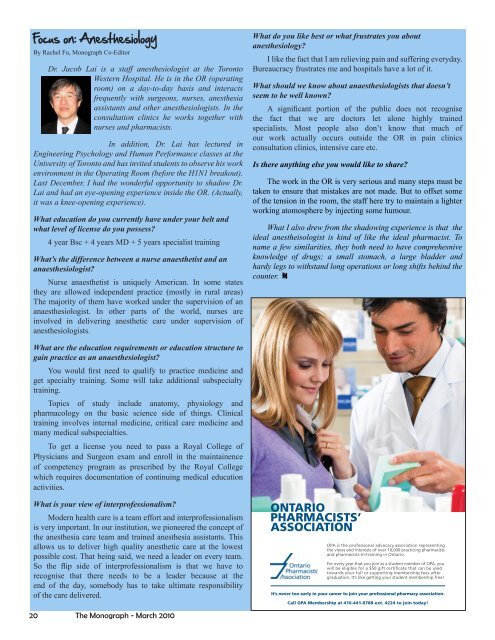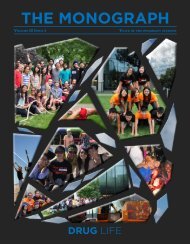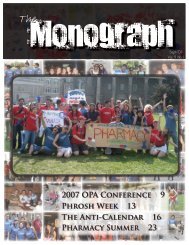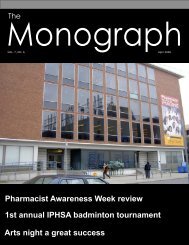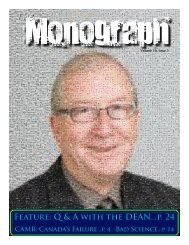March/April - University of Toronto's Undergraduate Pharmacy Society
March/April - University of Toronto's Undergraduate Pharmacy Society
March/April - University of Toronto's Undergraduate Pharmacy Society
You also want an ePaper? Increase the reach of your titles
YUMPU automatically turns print PDFs into web optimized ePapers that Google loves.
Focus on: Anesthesiology<br />
By Rachel Fu, Monograph Co-Editor<br />
Dr. Jacob Lai is a staff anesthesiologist at the Toronto<br />
Western Hospital. He is in the OR (operating<br />
room) on a day-to-day basis and interacts<br />
frequently with surgeons, nurses, anesthesia<br />
assistants and other anesthesiologists. In the<br />
consultation clinics he works together with<br />
nurses and pharmacists.<br />
In addition, Dr. Lai has lectured in<br />
Engineering Psychology and Human Performance classes at the<br />
<strong>University</strong> <strong>of</strong> Toronto and has invited students to observe his work<br />
environment in the Operating Room (before the H1N1 breakout).<br />
Last December, I had the wonderful opportunity to shadow Dr.<br />
Lai and had an eye-opening experience inside the OR. (Actually,<br />
it was a knee-opening experience).<br />
What education do you currently have under your belt and<br />
what level <strong>of</strong> license do you possess?<br />
4 year Bsc + 4 years MD + 5 years specialist training<br />
What’s the difference between a nurse anaesthetist and an<br />
anaesthesiologist?<br />
Nurse anaesthetist is uniquely American. In some states<br />
they are allowed independent practice (mostly in rural areas)<br />
The majority <strong>of</strong> them have worked under the supervision <strong>of</strong> an<br />
anaesthesiologist. In other parts <strong>of</strong> the world, nurses are<br />
involved in delivering anesthetic care under supervision <strong>of</strong><br />
anesthesiologists.<br />
What do you like best or what frustrates you about<br />
anesthesiology?<br />
I like the fact that I am relieving pain and suffering everyday.<br />
Bureaucracy frustrates me and hospitals have a lot <strong>of</strong> it.<br />
What should we know about anaesthesiologists that doesn’t<br />
seem to be well known?<br />
A significant portion <strong>of</strong> the public does not recognise<br />
the fact that we are doctors let alone highly trained<br />
specialists. Most people also don’t know that much <strong>of</strong><br />
our work actually occurs outside the OR in pain clinics<br />
consultation clinics, intensive care etc.<br />
Is there anything else you would like to share?<br />
The work in the OR is very serious and many steps must be<br />
taken to ensure that mistakes are not made. But to <strong>of</strong>fset some<br />
<strong>of</strong> the tension in the room, the staff here try to maintain a lighter<br />
working atomosphere by injecting some humour.<br />
What I also drew from the shadowing experience is that the<br />
ideal anestheisologist is kind <strong>of</strong> like the ideal pharmacist. To<br />
name a few similarities, they both need to have comprehesnive<br />
knowledge <strong>of</strong> drugs; a small stomach, a large bladder and<br />
hardy legs to withstand long operations or long shifts behind the<br />
counter. M<br />
What are the education requirements or education structure to<br />
gain practice as an anaesthesiologist?<br />
You would first need to qualify to practice medicine and<br />
get specialty training. Some will take additional subspecialty<br />
training.<br />
Topics <strong>of</strong> study include anatomy, physiology and<br />
pharmacology on the basic science side <strong>of</strong> things. Clinical<br />
training involves internal medicine, critical care medicine and<br />
many medical subspecialties.<br />
To get a license you need to pass a Royal College <strong>of</strong><br />
Physicians and Surgeon exam and enroll in the maintainence<br />
<strong>of</strong> competency program as prescribed by the Royal College<br />
which requires documentation <strong>of</strong> continuing medical education<br />
activities.<br />
What is your view <strong>of</strong> interpr<strong>of</strong>essionalism?<br />
Modern health care is a team effort and interpr<strong>of</strong>essionalism<br />
is very important. In our institution, we pioneered the concept <strong>of</strong><br />
the anesthesia care team and trained anesthesia assistants. This<br />
allows us to deliver high quality anesthetic care at the lowest<br />
possible cost. That being said, we need a leader on every team.<br />
So the flip side <strong>of</strong> interpr<strong>of</strong>essionalism is that we have to<br />
recognise that there needs to be a leader because at the<br />
end <strong>of</strong> the day, somebody has to take ultimate responsibility<br />
<strong>of</strong> the care delivered.<br />
20 The Monograph - <strong>March</strong> 2010<br />
ONTARIO<br />
PHARMACISTS’<br />
ASSOCIATION<br />
OPA is the pr<strong>of</strong>essional advocacy association representing<br />
the views and interests <strong>of</strong> over 10,000 practicing pharmacists<br />
and pharmacists-in-training in Ontario.<br />
For every year that you join as a student member <strong>of</strong> OPA, you<br />
will be eligible for a $50 gift certificate that can be used<br />
towards your full or supporting membership fees after<br />
graduation. It’s like getting your student membership free!<br />
It’s never too early in your career to join your pr<strong>of</strong>essional pharmacy association.<br />
Call OPA Membership at 416-441-0788 ext. 4224 to join today!


